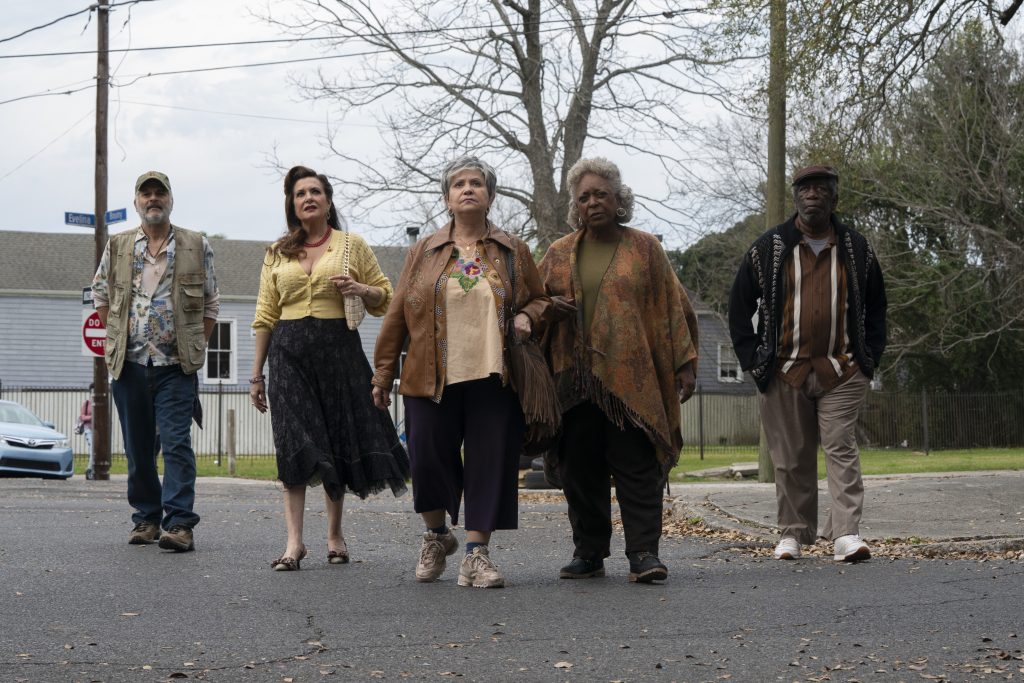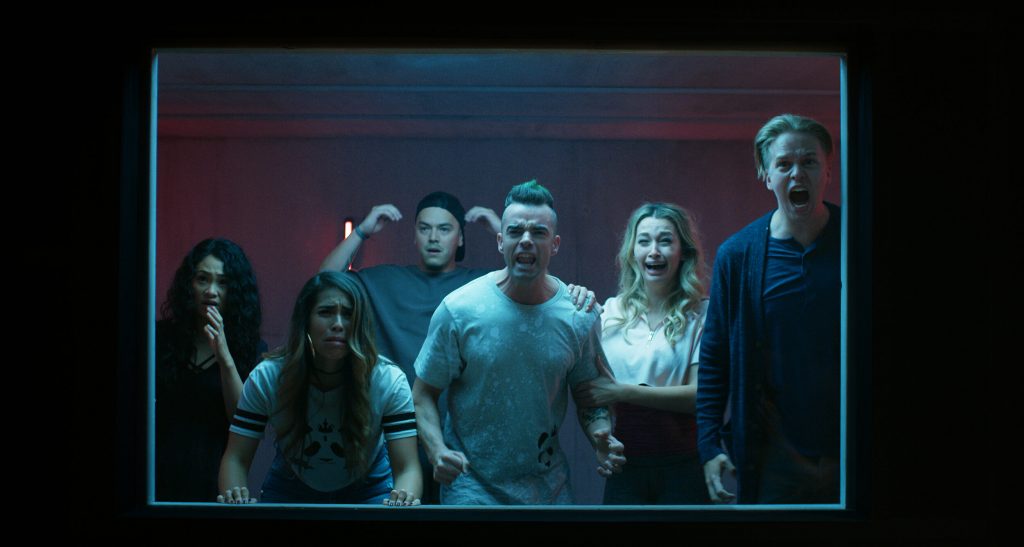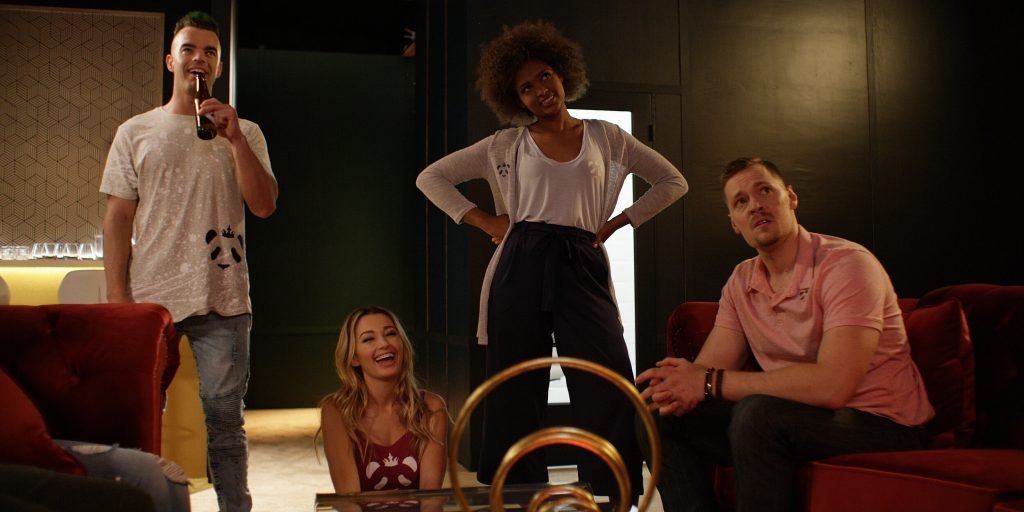December 30, 2021
by Carla Hay

Directed by Gigi Saul Guerrero
Culture Representation: Taking place in the fictional U.S. city of Oak Springs, the horror film “Bingo Hell” features a racially diverse cast of characters (Latino, white, African American and Asian) representing the working-class, middle-class and wealthy.
Culture Clash: A working-class city affected by gentrification gets targeted by a sinister gambling mogul, who promises to make people rich by playing bingo.
Culture Audience: “Bingo Hell” will appeal primarily to people who don’t mind watching horror movies that put more emphasis on campiness than being scary.

“Bingo Hell” takes a good concept for a horror movie and squanders it on a cheap-looking flick that’s short on scares and too heavy on campiness. It’s like a very inferior episode of “Tales From the Crypt” but made into a movie. Not even the charismatic talent of “Babel” Oscar nominee Adriana Barraza can save this misguided and monotonous film, because the “Bingo Hell” filmmakers make her protagonist character into a simplistic and annoying parody of a busybody senior citizen.
“Bingo Hell” is part of Blumhouse Television’s “Welcome to the Blumhouse” series partnership with Prime Video to showcase horror/thriller movies directed by women and people of color. The movie touches on issues that many underprivileged people of color face when they are priced out of neighborhoods that become gentrified. However, this social issue is flung by the wayside when the movie devolves into a predictable and dull story about a demon taking over a community, culminating in a badly staged showdown with no surprises.
Gigi Saul Guerrero directed “Bingo Hell” and co-wrote the movie’s screenplay with Shane McKenzie and Perry Blackshear. For Hulu’s “Into the Dark” horror anthology series (another Blumhouse production), Guerrero directed and co-wrote 2019’s “Culture Shock,” which did a much better job of combining horror with socioeconomic issues of race and privilege in America. One of the worst aspects of “Bingo Hell” is the movie’s musical score, which sounds like irritating sitcom music. The score music (by Chase Horseman) is very ill-suited for a horror movie that’s supposed to be terrifying.
In “Bingo Hell,” Barraza plays a widow named Lupita, a feisty, longtime resident of the fictional U.S. city called Oak Springs. Most of Oak Springs’ residents are low-income, working-class people. Senior citizens and people of color are a large percentage of the city’s population. Lupita, who lives by herself, has been getting letters in the mail from real-estate developers asking her to sell her home, but she refuses.
As an example of how she feels about being unwilling to sell her home, an early scene in the movie shows Lupita getting one of these letters, from a company called Torregano Real Estate. She takes a lit cigar and stubs it on the letter. Lupita rants to anyone who listens that no amount of money can make her sell her home. She also doesn’t like that some of her friends have taken offers to sell their homes, and she fears that more of her neighborhood friends will also sell their homes and move away.
And if it isn’t made clear enough that Lupita hates that her neighborhood is being gentrified, when she walks down a street and sees a young hipster woman drinking coffee, Lupita deliberately bumps into the woman so that she spills the coffee. Lupita pretends to be sorry for this “accident,” but she really isn’t sorry. She has a smug grin on her face, as if she’s glad that that she caused this mishap. Lupita is a senior citizen in her 60s, but she has the emotional maturity of a 16-year-old.
Lupita is a stereotypical nosy old lady who has to be in everybody else’s business because she has too much time on her hands. One by one, she visits her four closest confidants. Yolanda (played by Bertila Demas) is a friendly owner of a hair salon, where gossipy grandmother Dolores (played by L. Scott Caldwell) is a regular customer. Just like Lupita, Dolores says she doesn’t want to sell her house.
Clarence (played by Grover Coulson) is a laid-back mechanic who’s been working on one of his vintage cars for years. He’s been working on it for so long, it’s become an inside joke among these friends. Morris (played by Clayton Landey) is a “regular guy” plumber who comes into the hair salon one day to do some pipe repairs. Morris has a crush on Yolanda. Since they are both single, there’s some flirtation between them that’s not very interesting.
The community has been talking about the mysterious death of a widower named Mario (played by David Jensen), who is shown dying in the movie’s opening scene. He is sitting at a table in his home with a crazed look on his face, as he says: “I sold the house to him. I love him.”
A sinister-sounding male voice in the distance can be heard saying, “She would be so proud,” in reference to Mario’s late wife Patricia. Mario suddenly begins gorging on bingo balls until he chokes and dies. Meanwhile, a suitcase of cash is seen nearby in the room where Mario has died. All of these are obvious clues about what’s to come later in the story.
Meanwhile, Dolores has been having some family drama at home. Her rebellious teenage grandson Caleb (played by Joshua Caleb Johnson) and Caleb’s single mother Raquel (played by Kelly Murtagh) have come to stay with Dolores because Raquel has been having financial problems. Dolores’ son is Caleb’s father, who is described in the movie as a deadbeat dad who is not involved in raising Caleb.
Raquel and Dolores frequently clash because Dolores thinks that Raquel is a terrible mother who’s too lenient with Caleb (who’s about 15 or 16), while Raquel thinks Dolores is too strict and a failure as a mother because Dolores’ son turned out to be an irresponsible person. The movie wastes a lot of time with this family squabbling. The only purpose is to show that Raquel is money-hungry but she’s too lazy to want to find a job, which is an attitude that affects her decisions later in the movie.
It’s also problematic that the one character in the movie who’s a young African American male is portrayed as someone who commits crimes. Caleb’s misdeeds include breaking into cars. It’s such a lazy and unnecessary negative stereotype that is over-used in movies and TV. This gross stereotype doesn’t accurately represent the reality that most African American teens are not troublemaking criminals.
Dolores spends a lot of time at Oak Springs Community Center East, where she and some of her friends like to play bingo. The community center is also a place for support-group meetings. Eric (played by Jonathan Medina) is a local man in his 30s who leads a support group meeting.
Lupita invites Eric to the next bingo game, but he declines, by saying: “Bingo is not my thing. Maybe in 50 years, when I’m your age.” Eric isn’t disrespectful to Lupita, because he calls Lupita and Dolores “legends” of Oak Springs. Lupita feels good enough about the community center that when she finds a $100 bill on the street (the bill is covered with a mysterious white gummy substance), she donates the $100 to the community center by dropping the bill in a donation box.
Not long after this act of generosity, a big black Cadillac shows up in town. The driver calls himself Mr. Big (played by Richard Brake), a gambling mogul who speaks in an exaggerated Southern drawl and has an evil smirk. Mr. Big has come to town because he’s opening Mr. Big’s Bingo, a gambling hall specifically for bingo games.
Mr. Big talks in the type of grandiose clichés that you might expect from a carnival huckster or an infomercial hawker. He shouts to a crowd in Oak Springs: “They say that money can’t buy happiness! I disagree! You know what kinds of people believe this nonsense? Losers! Now tell me, Oak Springs, are you losers?”
Mr. Big makes a big splash in the community by showing off his wealth and with a flashy ad campaign where he promises that people can win thousands of dollars per game at Mr. Big’s Bingo. After this bingo hall opens, people in the community who play at Mr. Big’s Bingo inevitably get greedy and competitive. Because it’s a horror movie, you know where this is going, of course.
The horror part of “Bingo Hell” is frustratingly undercut by hammy acting from Brake and the aforementioned sitcom-like musical score. Meanwhile, the characters in the movie act increasingly like caricatures, as the cast members give average or subpar performances. What started out as a promising portrait of how gentrification and greed can cause horror in a community turns into a silly gorefest with ultimately nothing meaningful to say and nothing truly frightening to show.
Prime Video premiered “Bingo Hell” on October 1, 2021.


